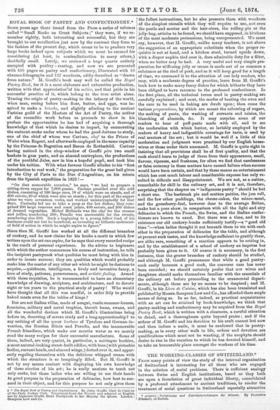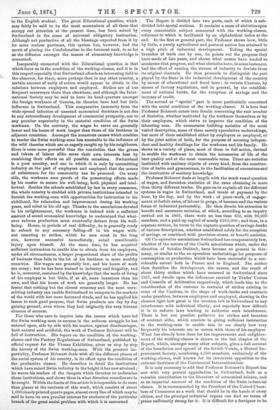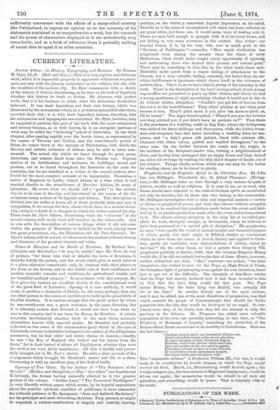THE WORKING-CLASSES OF SWITZERLAND."' FROM many points of view the
study of the internal organisation of Switzerland is interesting for all those who are engaged in the solution of social problems. There is sufficient analogy between Swiss and English institutions, based as they both are upon a foundation of great individual liberty, consolidated by a profound attachment to ancient traditions, to render the
use by Alphonse Gouffe, Head Pastrycook to her Majesty the Queen. London : * Arbeiter - Verhaltnisse end Fainikeinrichtungen der .5eloetz. By Professor
to the English student. The great Educational question, which may fairly be said to be the most momentous of all those that occupy our attention at the present time, bas been solved by Switzerland in the sense of universal obligatory instruction. Although not productive of all the blessings expected from it by its more zealous partisans, this system has, however, had the merit of placing the Confederation in the foremost rank, in so far as the diffusion amongst the masses of elementary knowledge is concerned.
Inseparably connected with the Educational question is that which faces us in the condition of the working-classes, and it is in this respect especially that Switzerland affords an interesting field to the observer, for there, more perhaps than in any other country, a certain amount of unity of action would appear to obtain in the relations between employers and employed. Strikes are of less frequent occurrence there than elsewhere, and although the Inter- national Society may be said to have its head-quarters amongst the foreign workmen of Geneva, its theories have had but little influence in Switzerland. This comparative immunity from the wide-spread infection of unsound economical doctrines is not due to any extraordinary development of commercial prosperity, nor to any peculiar superiority in the material condition of the Swiss workman. On the contrary, the wages he earns are generally lower and his hours of work longer than those of his brethren in adjacent countries. Amongst the numerous causes which combine to render the Swiss working-man less amenable to the influence of the wild theories which are so eagerly caught up by his neighbours, there is none more powerful than the conviction that the givers and takers of labour alike serve their own interests best by combining their efforts on all possible occasions. Switzerland is a poor country, and one in which it is only by unremitting industry on the part of employers and employed that the means of subsistence for the community can be procured. On every side, the workman sees proofs of the persevering efforts made by his master to secure his well-being, both physical and intel- lectual. Besides the schools established by law in every commune, the whole country is studded with private institutions intended to -furnish the working-man with opportunities for instruction in his childhood, for relaxation and improvement during his working years, and relief in his old age. Thanks to the associations devoted to his enlightenment, the workman is imbued with a sufficient amount of sound economical knowledge to understand that what- ever reduces production must eventually detract from his well- being. Hence, in periods of real difficulty, he is generally ready to submit to any necessary falling-off in his wages with- out resorting to strikes, which he sees must in the long run, however successful immediately, entail considerable injury upon himself. At the same time, he has acquired sufficient instruction to enable him to obtain from his employers, under all circumstances, a larger proportional share of the profits of business than falls to the lot of his brethren in more wealthy -countries. His wages are generally low, and his hours of work are many ; but he has been trained to industry and frugality, and be is, moreover, sustained by the knowledge that the mode of living of his employer is but little, if at all, more luxurious than his own, and that his hours of work are generally longer. He has learnt that nothing but the closest economy and the most unre- mitting industry can enable Switzerland to compete in the markets of the world with her more favoured rivals, and he has applied his lesson to such good purpose, that Swiss products are day by day gaining ground, even where they had originally the very faintest chances of success.
For those who care to inquire into the causes which have led the Swiss working-man to success in the arduous struggle be has entered upon, side by side with his master, against disadvantages, both natural and artificial, the work of Professor Bohmert will be full of instruction. His report on the condition of the working- classes and the Factory Regulations of Switzerland, published by official request for the Vienna Exhibition, gives us step by step the history of the Swiss working-man. With the greatest im- partiality, Professor Bohmert deals with all the different phases of the social system of his country, in its effect upon the condition of the productive classes. He describes in detail the institutions which have raised Swiss industry to the height it has now attained ; he warns his readers of the dangers which threaten to undermine those institutions, and shows them in what direction remedies are to be sought. Within the limits of this article it is impossible to do more than glance at the contents of this work, which consists of about 1,000 closely printed quarto pages, almost every line of which may be said to have its own peculiar interest for students of the particular branch of the great social problem with which it is concerned The Report is divided into two parts, each of which is sub- divided into special sections. It contains a mass of statistics upon every conceivable subject connected with the working-classes, reference to which is facilitated by an alphabetical index at the end. In the first or general part, the Professor shows how, little by little, a purely agricultural and pastoral nation has attained to a high pitch of industrial development. Taking the special branches of trade one by one, he points out the progress they have made of late years, and shows what causes have tended to accelerate that progress, and what obstacles have, in some instances, had the effect of causing the stream of industry to deviate from its original channels. He then proceeds to distinguish the part played by the State in the industrial development of the country by means of educational and fiscal laws ; in certain Cantons, by means of factory regulations, and in general, by the establish- ment of national banks, for the reception of savings and the increase of credit.
The second or " special " part is more particularly concerned with the social condition of the working-classes. It is here that Professor Biihmert enters into details concerning the vast number of Societies, whether instituted by the workmen themselves or by their employers, which strive to improve the condition of the labouring man. He enumerates building societies of the most varied description, some of them merely speculative undertakings, but most of them established either by employers or employed, or by the joint action of both, for the purpose of securing indepen- dent and healthy dwellings for the workman and his family. He shows us a variety of plans, most of them in full action, devised to enable the workman to obtain the necessaries of life of the best quality and at the most reasonable rates. There are societies instituted with sanitary objects of every kind, from the construc- tion of baths and gymnasiums, to the facilitation of excursions and the inculcation of sanitary knowledge.
Professor Biihmert deals at length with the much vexed question of wages, and furnishes Statistics of the rates obtaining in more than thirty different trades. He goes on to explain all the different systems in vogue in Switzerland, and treats of payment by the hour, by the day, and by the week ; of piece-work, of engage- ments at forfeit-rates, of labour in gangs, of bonuses and the various forms of industrial partnership. He then directs his attention to benefit and assurance societies, of which, according to an inquiry carried out in 1865, there were no less than 632, with 96,003 members, and a paid-up capital of nearly £315,000 ; and then, in a separate section, he turns to the cognate question of savings-banks of various descriptions, whether established solely for the reception of savings, or combined with provision-stores or benefit societies.
Of Co-operative associations Switzerland has comparatively few, whether of the nature of the Credit associations which, under the direction of Schulze-Delitsch, have become so general in Ger- many, or similar to the co-operative undertakings for purposes of consumption or production which have been successful to a con- siderable extent both in France and in England. The author then describes the development, the causes, and the result of about thirty strikes which have occurred in Switzerland since 1837, and dwells upon the influences exerted by Trades' Unions and Councils of Arbitration respectively, which leads him to the consideration of the customs in restraint of strikes existing in some of the Cantons, in the shape of work-books and contracts under penalties, between employers and employed, showing in the clearest light how great is the aversion felt in Switzerland to any interference with individual liberty, and especially how difficult it is to enforce laws tending to authorise such interference. There is but one possible palliative for strikes and breaches of contract alike, which consists in giving sufficient instruction to the working-man to enable him to see clearly how very frequently his interests are in unison with those of his employer. What has already been done for the improvement and enlighten- ment of the working-classes is shown in the last chapter of the Report, which, amongst many other subjects, gives a full account of the foundation and spread of the Griitli-Verein, a Mutual Im- provement Society, numbering 4,500 members, exclusively of the working-classes, well known for its inveterate opposition to the extreme doctrines of the Continental Internationalists.
It is only necessary to add that Professor Bolnert's Report has met with very general approbation in Switzerland, both as a valuable contribution to the literature of economical science, and as an impartial account of the condition of the Swiss industrial classes. It is recommended by the President of the United Cham- bers of Commerce as a work that should be in the hands of every citizen, and the principal industrial organs can find no terms of praise sufficiently strong for it. It is difficult for a foreigner to be sufficiently conversant with the affairs of a many-sided country like Switzerland, to express an opinion as to the accuracy of the statements contained in so comprehensive a work, but the research and the power of observation displayed in it are undoubtedly very remarkable, and as a book of reference there is probably nothing of recent date to equal it in other countries.




































 Previous page
Previous page